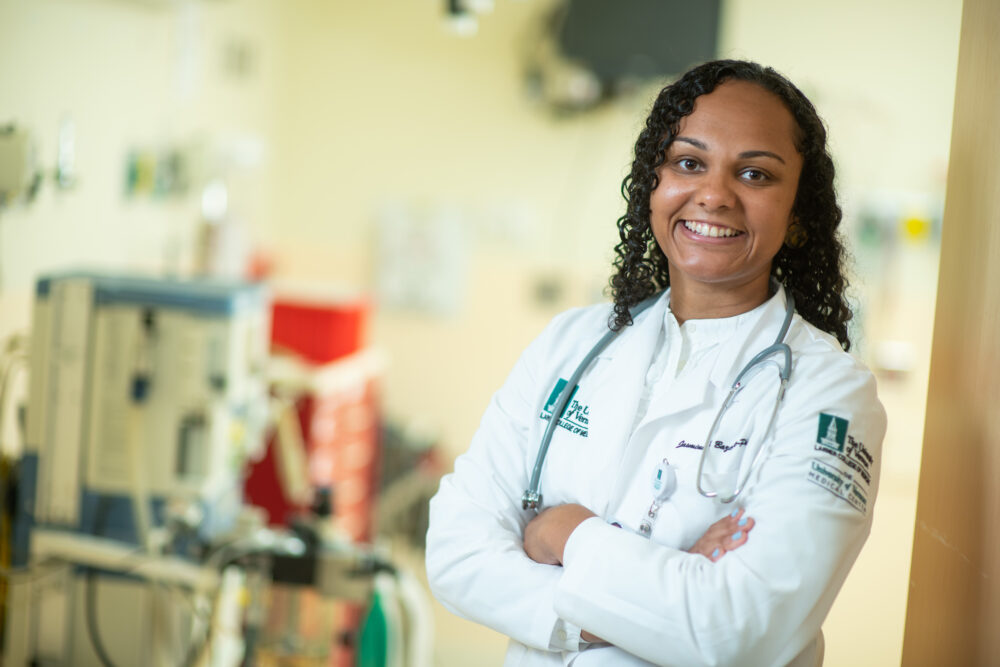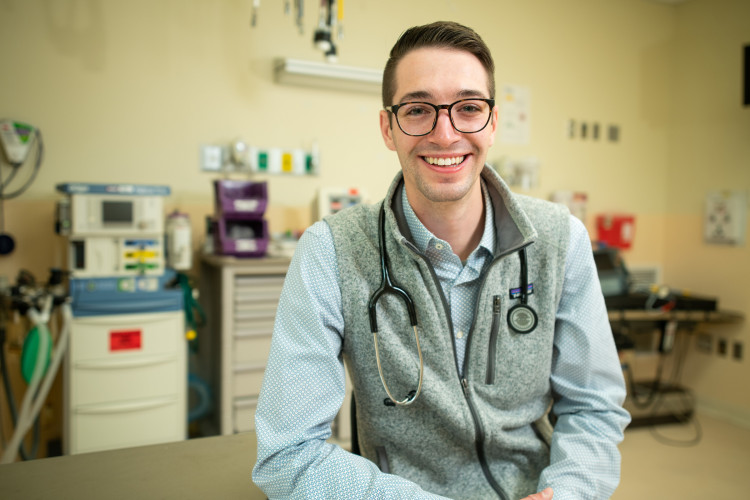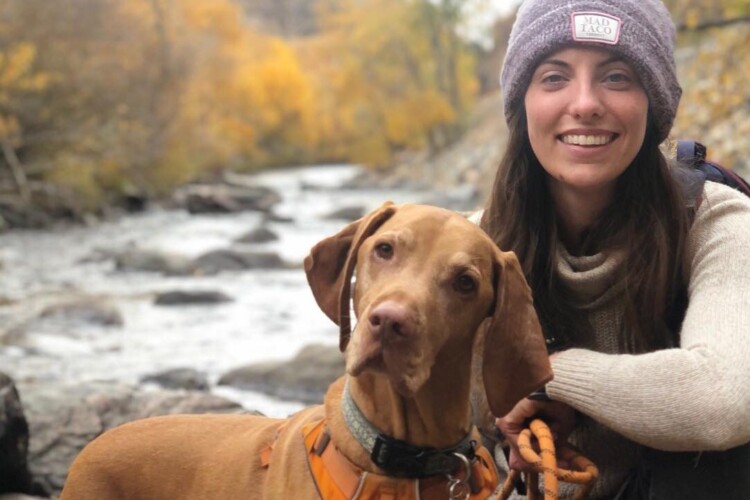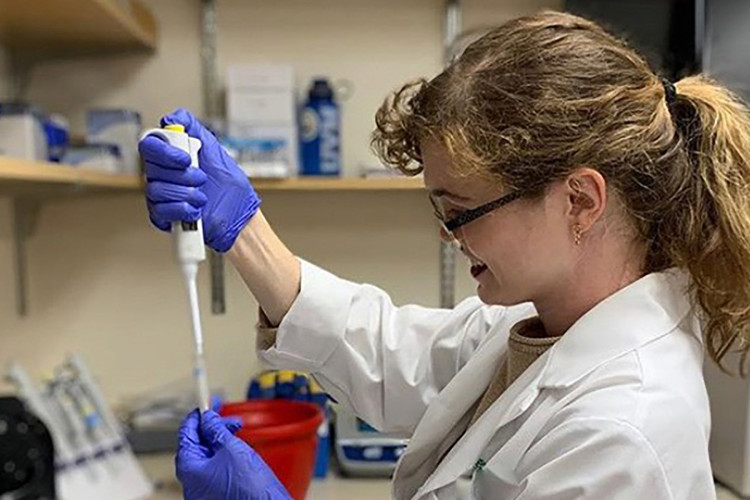Overview
UVM’s Post-Bacc Pre-Med program is your solution to realizing your future as a healthcare provider. We are excited to support you in your journey. Here in Burlington, Vermont, situated on the shores of Lake Champlain and voted one of the nation’s top twenty college cities by Princeton Review, you will have the opportunity to obtain your pre-health pre-requisite requirements and take advanced science courses taught by UVM Larner College of Medicine Faculty in person or online. Our 12-24-month program helps students pursue medical, dental, veterinary, pharmacy, physician assistant, nurse practitioner, physical therapy, occupational therapy, and other health professions.
What sets UVM apart
+25 year track record
UVM’s Post-Baccalaureate Program is backed by over 25 years of experience helping students gain admission to medical school.
Medical school on campus
Based at a leading academic medical center, teaching hospital, and Level I trauma center, UVM’s Post-Bacc program is aligned with the UVM Larner College of Medicine and the UVM College of Nursing and Health Sciences.
Research, patient care, and shadowing opportunities
Access research on campus and direct patient care experience with the UVM Health Network or other urban and rural health clinics in the area.
Customized curriculum & support
Chart your own course, start in any semester, and finish within 12 to 24 months. Your pre-health advisor and peer mentors will guide you every step of the way.
Committee letter of endorsement
UVM’s Pre-health Committee Letter Process will enable you to highlight and present your academic and personal strengths in your medical or health professional school application.
Linkage agreements
You are guaranteed an interview with schools on our linkage agreement list, provided you meet the professional school guidelines and minimum GPA requirement.
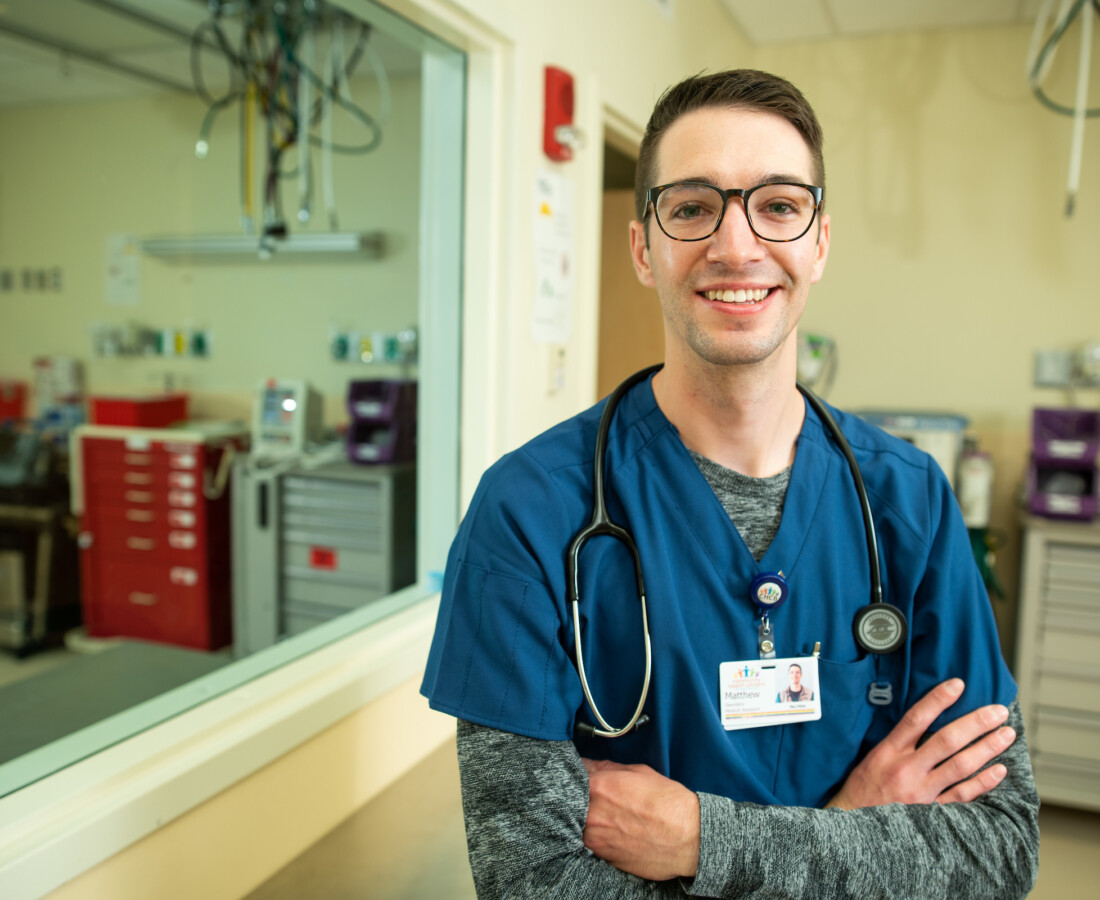
Be ready for medical school in one year
A high percentage of our post-baccalaureate program students successfully matriculate into medical school *
- 70% of students on a pre-med track matriculated into a M.D./D.O. program. Well above the national average of 43 percent.
- 53% of students invited to interview at Larner College of Medicine, are accepted
*These statistics are representative of those applying to medical school since 2019, many of our students are successfully applying to other health professional schools, and others often do not apply within one cycle.
Admissions
UVM’s Post-Bacc Pre-Medical program is right for you if you:
- Have a bachelor’s degree with a GPA of 3.2 or higher and a strong academic record.*
- Lack the science and math courses needed as a pre-med, pre-vet, pre-dental, pre-physician assistant, or pre-health student.
- Are committed to advancing in the field of health and medicine.
- Want personalized advising and one-on-one guidance on your medical career journey.
* Exceptions may be made for those who have less than a 3.2 GPA, but who are able to demonstrate an aptitude for academic success based on supporting information collected during the application process including your personal statement and your letters of recommendation.
Tracks
Choose the Post-Bacc Pre-Med curriculum to achieve your goals
Each of the post-baccalaureate program tracks is built specifically around your career goals.
Our pre-health advisors will also work with you to ensure you understand the curriculum, research, and patient care opportunities that will support your medical or healthcare application.
With our specialized pre-health tracks, you’ll get the education you need to be successful in your field of interest. Choose from:
Do you need advanced science courses to strengthen your credentials for Health Professional School? UVM Larner College of Medicine (LCOM) faculty offer three online advanced sciences courses in biochemistry, emergency medicine research, and physiology.
The advanced online Post-Bacc courses outlined below complement the existing Post-Bacc Pre-Med program and provide students the opportunity for further medical science study at the graduate level.
Courses Offered
EMED 3000: Emergency Medicine Research I (4 credits with lab online) – 2 lectures per week focused on the foundations of clinical research with a 4-hour lab. Introduction to research in Emergency Medicine with clinical exposure including shadowing EMTs, RNs, and MDs. Students will learn about research ethics, informed consent, and clinical epistemology.
MPBP 6010: Physiology – An integrated examination of the physiology and pharmacology of the peripheral nervous, muscle and cardiovascular systems in the human body.
BIOC 3001: Biochemistry – Provides a broad introduction to the field of biochemistry. Students will explore the molecular basis and chemical principles of biochemistry pertinent to living systems. This course is taught by LCOM faculty and emphasizes the relevance of biochemistry to health, disease, physiology and medicine. This course is an excellent MCAT preparatory course.
Other Courses:
- PHRM 3000 Medical Cannabis
- PHRM 3720 Toxicology
- PHRM 3900 Topics of Molecular Cell Pharm
- MMG 3220 Advanced Medical Microbiology
- MMG 3230 Immunology
- NSCI 3250 Human Neuro-Anatomy – Can satisfy anatomy requirement. Reach out to instructor on pre-reqs.
- RAD 6890 Human Anatomy via Radiology (online)
- PHARM 6010 Advanced Systems Pharmacology
Are you deciding between osteopathic and allopathic medicine? The key difference between osteopathic and allopathic doctors is that some osteopathic doctors offer manual medicine therapies and tend to focus on whole-body healing, with or without traditional medication.
The Post-Bacc Pre-Med courses outlined below are a sample of the pre-medical requirements for admission to medical school to become an MD or DO. Note: Most applicants to highly competitive medical schools in the U.S. apply with more than the minimum course requirements.
Sample Post-Bacc Pre-Med Curriculum
Sample Curriculum:
2 semesters General Chemistry with labs, 8 credits
2 semesters Organic Chemistry with labs, 8 credits
2 semesters General Biology with labs, 8 credits
2 semesters Physics with labs, 10 credits
Highly Recommended:
Biochemistry (lab not required), 3 credits
Microbiology with lab, 4 credits
Recommended:
Genetics
Cell Biology
Medical Ethics
Nutrition
Biomedical Statistics
Osteopathic Physician, DO
Sample Curriculum:
2 semesters General Chemistry with labs, 8 credits
2 semesters Organic Chemistry with labs, 8 credits
2 semesters Biology with labs, 8 credits
2 semesters Physics with labs, 10 credits
1 semester Biochemistry (lab not required), 3 credits
Recommended Courses:
Anatomy & Physiology
Microbiology
Cell Biology
Genetics
Nutrition
A Note from Your Pre-Med Advisor:
Twenty percent of medical schools require college calculus and English. The “Medical School Admissions Requirements” reference, available at major bookstores, is a good starting point to compare requirements for schools of interest. The AAMC website also has important information.
Dentists evaluate, diagnose, prevent, and treat diseases and disorders that contribute to a patient’s oral and overall health. To become a dentist, completion of a graduate dental school program is required, plus clinical practice in an educational setting before passing licensing exams.
The Post-Bacc Pre-Dental program courses outlined below will help you meet the undergraduate sciences requirements for admission to dental school.
Sample Post-Bacc Pre-Dental Curriculum:
2 semesters General Chemistry with labs, 8 credits
2 semesters Organic Chemistry with labs, 8 credits
2 semesters Biology with labs, 8 credits
2 semesters Physics with labs, 10 credits
2 semesters English, 6 credits
1 semester Sculpture, 3 credits
Highly Recommended:
Microbiology
Biochemistry
Cell Biology
Nutrition
A Note from Your Advisor:
Dentistry is a career that offers greater independence from insurance limitations and lends itself to independent practice. Manual dexterity and a flare for art fit nicely. Shadowing one or more dentists is highly recommended. Given the relationship between medicine and dentistry, the curriculum is similar, and some institutions that offer both programs combine medical and dental students in the first year. Pre-Dental students at UVM are eligible for the Committee Letter Process, just as Pre-Medical students are.
Pharmacists are a part of the health team caring for patients with direct patient contact. While most pharmacists work directly with the public, there is also the opportunity for research, hospital patient care, and innovation with a pharmacy career.
The Post-Bacc Pre-Pharmacy program courses outlined below will help you meet the undergraduate sciences requirements for admission to pharmacy school.
Sample Post-Bacc Pre-Pharmacy Curriculum:
2 semesters General Chemistry with labs, 8 credits
2 semesters General Biology with labs, 8 credits
2 semesters Organic Chemistry with labs, 8 credits
1 semester Statistics, 3 credits
1 semester Calculus I, 3 credits
1 semester Microbiology with lab, 4 credits
2 semesters Physics, 6 credits
1 semester General Psychology, 3 credits
3 semesters Humanities, 9 credits
1 semester Public Speaking, 3 credits
Highly recommended:
Liberal Arts electives
A Note from Your Advisor
Pharmacy is a critical link in the patient care chain, which includes considerable direct patient contact and care. You can investigate the possibilities by visiting the American Association of Colleges of Pharmacy (AACP) website.
Click here to explore scholarships.
Sample Entry into Nursing curriculum:
- Anatomy and Physiology I
- Anatomy and Physiology II
- Microbiology
- Nutrition
- Statistics
Curriculum Track for Entry into Nursing
Option A: Summer Term Start
Summer Term
- 2 Anatomy and Physiology with labs: ANPS 1190 & ANPS 1200, 4 credits each (also available during the academic year)
- 1 Statistics, STAT 1110, 3 credits
Fall Term
- 1 Nutrition, NFS 1043, 3 credits
- 1 Microbiology, Microbiology & Infectious Disease, MMG 2010, 4 credits
According to the American Nurses Association, approximately 60% to 80% of primary and preventive care can be performed by nurse practitioners. To achieve this level of expertise, nurse practitioners complete master’s or doctoral studies and pass licensing exams.
The Post-Bacc Pre-Nurse Practitioner program courses outlined below will help you meet the undergraduate course requirements for admission to a Nurse Practitioner program.
Sample Post-Bacc Pre-NP Curriculum:
- 2 semesters Human Anatomy & Physiology, 8 credits
- 2 semesters Chemistry with lab, 8 credits
- 1 semester Microbiology with lab, 4 credits
- 1 semester Human Nutrition, 3 credits
- 1 semester Statistics, 3 credits
- 1 semester Human Development (across the lifespan), 3 credits
Recommended:
- Courses in Biology, Psychology, Sociology, and English
Curriculum Tracks for NP Programs
Researching programs of interest and summarizing the courses required will be necessary before you can determine your specific needs. Our advisor is available to assist you regarding your plan. These plans include more courses than some programs require. Also, you may have recently completed some of the required courses as part of your undergraduate degree, thereby reducing the number of courses needed.
Option A: Summer Term Start
Summer Term
- 2 Anatomy and Physiology with labs: ANPS 1190 & ANPS 1200, 4 credits each (also available during the academic year)
Fall Term
- 1 Principles of Biology, BIOL 1400, 4 credits
- 1 General Chemistry: Outline of General Chemistry, CHEM 1150, or General Chemistry, CHEM 1400, 4 credits
- 1 English, 3 credits
- 1 Abnormal Psychology, PSYS 2500, 3 credits
- Prep for and/or take GRE
Spring Term
- 1 Principles of Biology, BIOL 1400, 4 credits
- 1 Outline of Organic & Biochemistry, CHEM 1150, 4 credits, or Outline of Organic Chemistry, CHEM 1580, 4 credits, or General Chemistry 2, CHEM 1450, 4 credits. NOTE: Some more selective programs require two General Chemistry courses (CHEM 1400 & 1450) plus a biochemistry. Please discuss which level of chemistry with your advisor.
- 1 Statistics, STAT 1110, 3 credits
- 1 Nutrition, NFS 1043, 3 credits
Summer Term
- 1 Genetics, BCOR 2300, 3 credits
- 1 Sociology, Social Organization of Death & Dying, SOC 2320, 3 credits
Option B: Fall Term Start
Fall Term
- 1 Human Anatomy & Physiology, ANPS 1190, 4 credits
- 1 General Chemistry: Outline of General Chemistry, CHEM 1150, or General Chemistry, CHEM 1400, 4 credits. Please discuss which level of chemistry with your advisor.
- 1 English, 3 credits
Spring Term
- 1 Human Anatomy & Physiology, ANPS 1200, 4 credits
- 1 Outline of Organic & Biochemistry, CHEM 1150, 4 credits, or Outline of Organic Chemistry, CHEM 1580, 4 credits, or General Chemistry 2, CHEM 1450, 4 credits NOTE: Some more selective programs require two General Chemistry courses (CHEM 1400 & 1450) plus a biochemistry. Please discuss which level of chemistry with your advisor.
- 1 Statistics, STAT 1110, 3 credits
- 1 Psychology, Abnormal Psychology, PSYS 2500, 3 credits
Summer Term
- 2 Principles of Biology courses with labs, BIOL 1400 & 1450, 4 credits each
Fall Term
- 1 Biochemistry, BIOC 3001, 3 credits
- 1 Microbiology, Microbiology & Infectious Disease, MMG 2010, 4 credits
- 1 Nutrition, NFS 1043, 3 credits
- Between terms prepare and/or take GRE
Spring Term
- 1 Genetics, BCOR 2300, 4 credits
- 1 Psychology, 3 credits
- 1 English, 3 credits
A Note from Your Advisor:
Nurse Practitioner programs for students with a bachelor’s degree other than nursing vary widely in terms of requirements. The minimum course requirements may not equal those of the competitive applicant, so additional science background is recommended.
Click here to explore scholarships.
An occupational therapy degree consistently ranks among the most meaningful college majors. A career in occupational therapy allows you to creatively work with individuals to help people engage in desired activities.
To be admitted to an Occupational Therapy Program, prospective students without required undergraduate science courses can take advantage of the Pre-Occupational Therapy track in UVM’s Post-Baccalaureate Pre-Medical Program.
There are many blended program options available to students; the following curriculum is a sample of an ODT program designed for those with a bachelor’s degree.
Sample Post-Bacc Pre-OT Curriculum:
Applicants must complete the following prerequisite courses with a cumulative GPA of 3.2 or greater prior to entry into the program:
- One semester of General Psychology (3 credits)
- One semester of Abnormal Psychology (3 credits)
- One semester of Human Development (3 credits)
- One semester of Statistics (3 credits)
- One semester of Biology (3 credits)
- One semester of Human Anatomy with lab (4 credits)
- One semester of Human Physiology with lab (4 credits)
- Two semesters of Social Sciences (Anthropology, Humanities, Philosophy, Sociology: 6 credits)
- One semester of Physics or Kinesiology (3 credits)
When published requirements are not specific regarding the number of credits or a lab, be sure to check with the admissions office of the school to which you are applying.
A Note from Your Advisor
Programs that combine a bachelor’s degree with a graduate program often require application to both at the outset of the undergraduate program. Many programs require the Graduate Record Exam (GRE). This profession is physically demanding and offers career flexibility.
Click here to explore scholarships.
Physical Therapists prevent and treat a wide variety of physical conditions due to disease, injury, or repetitive stress. They work with patients to improve function and movement. This profession is physically demanding and offers career flexibility.
The courses outlined below will help you meet the undergraduate science requirements for admission to a Physical Therapy program. There are many blended program options available to students, and the following curriculum is a sample for a DPT program designed for those with a bachelor’s degree. Many programs require the Graduate Record Exam (GRE).
Sample Post-Bacc Pre-PT Curriculum:
2 semesters Anatomy & Physiology, 8 credits
2 semesters General Chemistry with labs, 8 credits
2 semesters Physics with labs, 10 credits
1 semester Biology, 4 credits
1 semester Exercise Physiology, 4 credits
1 semester Psychology, 3 credits
1 semester Statistics, 3 credits
A Note From Your Advisor
There are many blended program options available to students. Programs that combine a bachelor’s degree with a graduate program often require application to both at the outset of the undergraduate program. Many programs require the Graduate Record Exam (GRE).
Click here to explore scholarships.
A Physician Assistant practices medicine as a clinician with direct patient care responsibilities under the supervision of a licensed physician. The curriculum in a PA program is equally intense but not as long as medical school, making it attractive for students who wish to complete their studies earlier and begin their direct patient care sooner.
The courses outlined below will help you meet the undergraduate course requirements for admission to a Physician Assistant program.
Sample Post-Bacc Pre-PA Curriculum:
- 2 semesters General Biology with labs, 8 credits
- 2 semesters Advanced Biology with labs, 6 credits OR
- 2 semesters Chemistry with labs, 8 credits
- 1 semester Anatomy and Physiology, 4 credits (Note: Many programs require 6 or 8 credits with labs)
- 2 semesters English (including composition), 6 credits
- 2 semesters Psychology or Sociology, 6 credits
Highly Recommended:
- Statistics, Microbiology, Nutrition, Physics, and Organic Chemistry
Curriculum Tracks for the PA Program
Researching programs of interest and summarizing the courses required will be necessary before you can determine your specific needs. Our advisor is available to assist you regarding your plan. These plans include more courses than some programs require. Also, you may have recently completed some of the required courses as part of your undergraduate degree, thereby reducing the number of courses needed.
Option A: Summer Term Start
Summer Term
- 2 Anatomy and Physiology with labs: ANPS 1190 and ANPS 1200, 4 credits each (also available during the academic year)
Fall Term
- 1 Principles of Biology, BIOL 1400, 4 credits
- 1 Chemistry, CHEM 1400, 4 credits
- 1 English, 3 credits
- 1 Psychopathology, PSYC 2500, 3 credits
- Prep for and/or take GRE
Spring Term
- 1 Principles of Biology, BIOL 1400, 4 credits
- 1 General Chemistry 2, CHEM 1450, 4 credits
- 1 Statistics, STAT 1110, 3 credits
- 1 Nutrition, NFS 1043, 3 credits
Summer Term
- 1 Genetics, BCOR 2300, 3 credits
- 1 Sociology, Social Organization of Death & Dying, SOC 2320, 3 credits
Option B: Fall Term Start
Fall Term
- 1 Human Anatomy & Physiology, ANPS 1190, 4 credits
- 1 Chemistry, CHEM 1400, 4 credits
- 1 English, 3 credits
Spring Term
- 1 Human Anatomy & Physiology, ANPS 1200, 4 credits
- 1 General Chemistry 2, CHEM 1450, 4 credits
- 1 Statistics, STAT 1110, 3 credits
- 1 Psychopathology, PSYC 2500, 3 credits
Summer Term
- 2 Principles of Biology courses with labs, BIOL 1400 and 1450, 4 credits each
Fall Term
- 1 Biochemistry, BIOC 3001, 3 credits
- 1 Microbiology, Microbiology & Infectious Disease, MMG 2010, 4 credits
- 1 Nutrition, NFS 1043, 3 credits
- Between terms prepare and/or take GRE
Spring Term
- 1 Genetics, BCOR 2300, 4 credits
- 1 Psychology, 3 credits
- 1 English, 3 credits
A Note from Your Advisor
Course requirements and timetables for Physician Assistant programs vary widely. Students should research programs of interest; one good source of information is the American Academy of Physician Associates. Developing a spreadsheet to assess common denominators in requirements to decide course choices is recommended. You can then plan your optimal curriculum in conjunction with your advisor.
Click here to explore scholarships.
Veterinarians study, diagnose, and treat injury and disease, as well as provide preventive care for their animal patients.
Vets can specialize in a broad range of fields and animal types, including internal medicine, research, public health, domestic animals, wildlife, and livestock. To become a veterinarian, one must complete graduate medical education, a residency, and pass licensing exams.
The courses outlined below will help you meet the undergraduate course requirements for admission to a Veterinary program.
Sample Post-Bacc Pre-Vet Curriculum:
Summer
2 General Chemistry courses intensively over eight weeks
CHEM 1400 and CHEM CHEM 1450, 4 credits each
(Assumes current with pre-calculus – algebra with trigonometry)
Fall Term
1 Principles of Biology, BIOL 1400, 4 credits
1 Organic Chemistry, CHEM 2580, 4 credits
1 Calculus I (MATH 1212, 3 credits, or MATH 1234, 4 credits)
Between terms, prepare for GRE here or the second winter
Spring Term
1 Principles of Biology, BIOL 1450, 4 credits
1 Organic Chemistry, CHEM 2585, 4 credits
1 Calculus II (MATH 1224, 3 credits, or MATH 1248, 4 credits)
Summer Term
2 Physics with labs over 10 weeks (algebra-based)
PHYS 11 with lab PHYS 1410, 5 credits
PHYS 12 with lab PHYS 1460, 5 credits
Fall Term
1 Animal Anatomy with lab, ASCI 111, 4 credits
1 Biochemistry, BCOR 1450, 3 credits
Elective Science or Animal Sciences (Genetics, BCOR 2300 or Animal Genetics, ASCI 2160, 3 credits) or English, Humanities, Social Sciences, as needed
Spring Term
1 Animal Nutrition, ASCI 1040, 3 credits
1 General Physiology, ASCI 1040, 3 credits
Any remaining Science, Animal Science, English, Humanities, or Social Science courses
Featured Summer Course for Pre-Vet Students
CREAM: Integrated Large-Animal and Agricultural Operation Management: On-Farm Dairy Intensive
This program is offered each summer through the College of Agriculture and Life Sciences (CALS) at the University of Vermont. During the summer 8 to 15 students manage a herd of 60 registered Holstein and Jersey cattle. This on-farm experience also includes special projects and field trips and offers students an uncommon experiential learning experience that will help distinguish them as future agriculture leaders. Visit the Cooperative for Real Education in Agricultural Management’s webpage for more information.
A Note from Your Advisor
Veterinary schools usually require more foundation courses than do medical schools. They also vary significantly, so interested students should research veterinary schools of interest to determine a list of courses needed. Animal care experience with a variety of animals is important. There is a shortage of large animal veterinarians across the US.
Click here to explore scholarships.
Other health professional school prerequisite tracks are customizable for you, such as optometry, podiatry, naturopathy, nurse anesthetist, anesthesiologist assistant, and more.
Want to learn more about a specific track?
Contact an Advisor“When I began the UVM Post-Bacc Pre-Medical (PBPM) program, I had no prior pre-medical science experience…after my time in the PBPM program, I completed all the necessary pre-medical requirements to apply and gain admission to medical school.”
Jasmine Bazinet-Phillips, 2021, as a second-year student at Robert Larner College of Medicine
Student Stories
Stories
Meet some of our students.
From philosophy to environmental science majors, Post-Baccalaureate Studies students come from a wide range of educational and professional backgrounds.
“Being on campus is a special part of the program. You study in the library and the hospital is right there; it’s very motivating and inspiring. If it’s one of those things that you really want to do, go and do it. Don’t be afraid.”
Michael N., currently enrolled, Pre-Allopathic Medical (MD) and Pre-Osteopathic Medical (DO) track
Michael’s journey from finance to medicine
UVM’s Post-Bacc students in the community
Here’s a look at some of the locations where UVM Post-Bacc Pre-Medical students have had research and direct patient care experiences.
Patient Care
- John Hopkins Hospital
- UVM Medical Center
- Vermont Gynecology
- Community Health Centers of Burlington
- Department of Veteran Affairs
- ScribeAmerica
- Howard Center- First Call
Volunteer Positions
- Howard Center
- Circle VT
- Medical Reserves Corp in D.C.
- American Red Cross
- Children’s Miracle Network
- Central Vermont Home Health & Hospice
- McClure-Millerxc Respite House
- Colon Cancer Coalition
Research Opportunities
- UVM Larner College of Medicine Vaccine Testing Center
- UVM Larner College of Medicine Cancer Center
- Biohaven Pharmaceuticals
- UVM Medical Center
- Children’s Hospital of Philadelphia
- Children’s National Hospital in D.C.
- UVM Department of Psychiatry
- SUNY Upstate Child and Adol Psychiatry Clinic
“I chose UVM’s Post-Bacc Pre-Med program because of the access to the medical center and ability to network with experienced medical professionals.”
Heather C., currently enrolled, Pre-Physician Assistant program
Instructors
Post-Bacc Advanced Track
-
 More Info
More InfoChristopher Berger, Ph.D.
Professor
-
 More Info
More InfoMichael Godsey, PhD
Assistant Professor
-
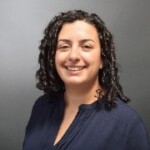 More Info
More InfoRoz King, MSN, RN, CNL
Program Manager
-
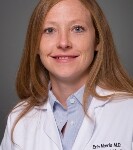 More Info
More InfoErin Morris, MD
Assistant Professor Maternal Fetal Medicine
-
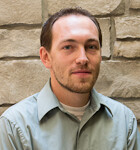 More Info
More InfoDmitriy Akselrod, MD
Assistant Professor
-
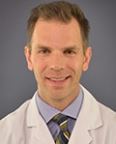 More Info
More InfoMatthew Gregory Geeslin, MD
Assistant Professor
Cost & Time
Tuition will vary whether you’re in-state or out-of-state, how many credits you take each term, and your personalized academic plan.
The average Post-Baccalaureate Pre-Medical student at UVM takes 26 credits during the academic year and 8 in the summer. Most students complete the program in one 12-month period. It is possible to stretch your program out to 18 or 24 months, depending on your circumstances.
For information about Professional and Continuing Education tuition and financial aid, please visit Student Financial Services (refer to Rates for Professional and Continuing Education (PACE) & On-Campus Undergraduate Certificate Programs). Summer tuition is offered at a discounted rate and can be found here. To get started, speak with an enrollment advisor who can help you customize your course plan and cost.
Scholarships
UVM offers a scholarship to the first 20 admitted and enrolled students who are beginning the program in the summer term. The scholarship will cover the cost of one course (3 or 4 credits). To receive the scholarship, you must successfully complete two or more summer courses. There is no need to apply; your advisor will notify you if you are eligible for the scholarship.
UVM recognizes that financial barriers may prevent students from completing the Post-Baccalaureate Pre-Medical Program. The Post-Bacc Pre-Med scholarship is intended to assist students in program completion, interested students are encouraged to speak with an advisor about scholarship and financial aid opportunities.
Scholarships do not have to be repaid and will be awarded to pay educational expenses (tuition, fees, textbooks, educational supplies) previously incurred or expected to be incurred.
* 2023 scholarships have closed. Please check back for 2024 scholarship opportunities.
After UVM
We’ll prepare you to successfully gain admission into medical school or health professional school. Here’s a look at some of the schools our students have gone to after they completed their post-baccalaureate program at UVM. For a more detailed list, see our FAQ.
- Brown University
- Columbia
- Colorado
- Dartmouth
- Johns Hopkins
- Michigan State University
- Tufts
- University of Vermont
MCAT Preparation
We work closely with students on their need for MCAT preparation because our goal is to have you as well-prepared as possible.
Additionally, in partnership with Kaplan Test Prep, UVM offers a discounted rate for the MCAT Prep Self-Paced Online course, which is open and available to all UVM students at a rate of $1,080 per student, a significant savings off of Kaplan’s current retail class rate of $1999 per student. Kaplan’s MCAT Prep Self-Paced Online course allows you to prep for the MCAT on the schedule that works best for you. There are many programs you can choose in your MCAT preparation, we can advocate on your behalf for additional discounted rates.
Medical school linkage agreements
One of the many benefits of attending UVM for your Post-Baccalaureate Pre-Medical education is that you can take advantage of linkage programs when it comes time to apply to medical schools or other health professional schools.

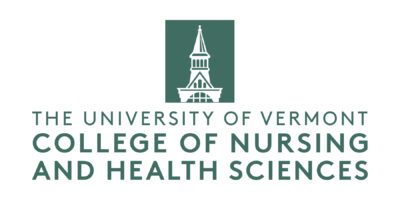
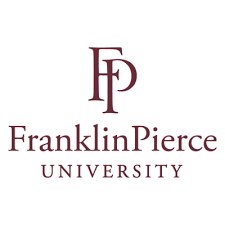
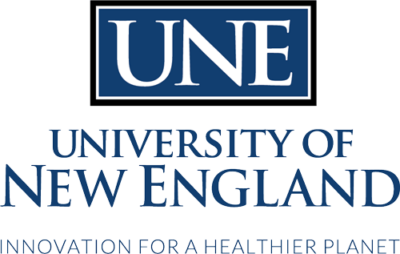
“The condensed nature of my Post-Bacc mimicked the rigors of medical school and taught me how to manage a demanding academic schedule.”
Elizabeth Kelly, 2021, while a first-year student at Robert Larner College of Medicine
FAQ
The Post-Baccalaureate Pre-Medical Program is for those with a bachelor’s degree who lack the prerequisite science courses to apply to medical school or professional healthcare programs.
The 24 to 37-credit Post-Bacc Pre-Med program is a one-to-two-year program designed for career changers who have very few medical school prerequisites or completed the prerequisites more than seven years ago. The 30-credit Master of Medical Science program is a one-year program for students who have already completed the basic medical school prerequisites and need a BCPM (Biology, Chemistry, Physics and Math) GPA enhancer. The Master of Medical Science program is offered online or in person. The Post-Bacc Pre-Med program is a hybrid of online and in-person learning. Both programs provide linkages with the Larner College of Medicine and other health professional schools, a committee letter evaluation, and personal advising.
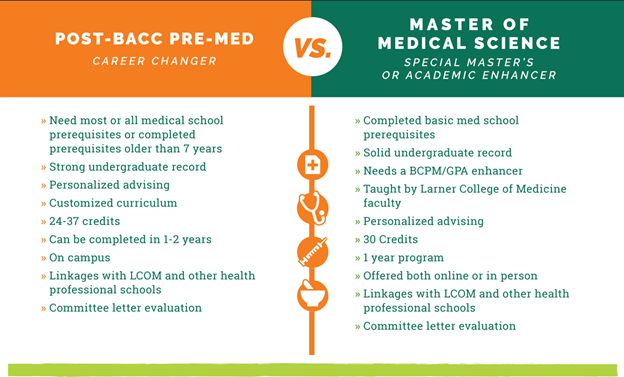
On average, about 60 students enroll each year. Students can begin the program in spring, summer, or fall semesters.
Yes. Many students find our program suits their academic and research needs prior to applying to medical school. However, the answer really depends on the number of credits you still need to complete, as well as your academic performance in these courses.
The committee seeks to admit those who will make the finest doctors, medical professionals, and healthcare providers and will be flexible where circumstances warrant. Please note that the pre-medical program is selective, as is getting into medical school and graduate healthcare programs. The average GPA for medical school admission is 3.7.
Yes, you may begin the program at any of our 3 start terms (Spring, Summer, or Fall) during the year. Most students choose to begin the program in the Summer or Fall term as it aligns best with their schedules.
While most students complete the program in one 12-month period, it is possible to stretch your program out to 18 or 24 months depending on your circumstances. We would work with you to design a plan in the case of an extended program.
Yes. Our students have prepared for graduate-level physical therapy, veterinary, dental, osteopathy, physician assistant, chiropractic, pharmacy, optometry, and public health degrees.
There is no on-campus housing for this program, but there are many options for off-campus housing. Many Post-Bacc students live together off-campus, within walking distance. Here are some housing resources in the Burlington area:
- UVM Off-Campus Housing
- Seven Days Housing For Rent
- Housing options are also posted in the Post-Bacc Pre-Med Hub
During your time as a Post-Bacc student, you will have access to a variety of resources to support your learning, including:
- UVM Libraries
- UVM Student Accessibility Services (SAS)
- UVM Tutoring Center
- UVM Counseling and Psychiatry Services (CAPS)
- UVM Center for Health & Well-being
- UVM Diversity, Equity and Inclusion & Identity Centers
- UVM Writing Centers
- UVM CATcard Service Center
- UVM Green Mountain Transit – Free Public Transportation with CATcard.
Students may be eligible for federal financial aid in the form of Federal Direct Stafford and/or Federal Direct PLUS loans or alternative (private) student loans.
To determine the types of aid for which you may be eligible and the process for applying, please visit the Non-Degree Financial Aid page on the UVM Student Financial Services website.
Please email learn@uvm.edu to inquire about eligibility and applying for the Post-Bacc Pre-Med program as an international student. Please review the Application process section of this page for more information on international student application deadlines and other information.
It is possible for some students to work while completing this program. However, there is an expectation that students dedicate time for volunteering and patient care. These opportunities will help set you apart when you apply to a medical or professional healthcare program.
Yes. Burlington is home to UVM’s Larner College of Medicine and the award-winning University of Vermont Medical Center, a teaching hospital and Level I Trauma Center focused on patient care. Burlington is Vermont’s largest city and home to several healthcare clinics and agencies where our students have found shadowing, internship, volunteer, and work opportunities in direct patient care.
UVM is an R1 research university, with its medical school located on the main campus. It is one of the top 10 cancer research facilities in the country and is a leader in many research disciplines including medical cannabis and biomedical research. Many of our students have found research opportunities in the Larner College of Medicine or the UVM Health Network while directly networking with graduate and medical faculty to line up research experience in a study.
The Post-Bacc Pre-Med program is a UVM Certificate Program, providing a bridge into medical school and healthcare professional schools. The program is administered by the Professional and Continuing Education team, where our student services staff is available to support you every step of the way.
One of the unique features of our program is that you’re getting the content, very intensively, that you’re going to have to cover in the MCAT. Most of our students do some MCAT prep as they move through the program, so they’re focused on not only the content but the test preparation. We work closely with students on their need for additional MCAT preparation because our goal is to have you as well-prepared as possible.
Additionally, in partnership with Kaplan Test Prep, UVM offers a discounted rate for the MCAT Prep Self-Paced Online course, which is open and available to all UVM students at a rate of $1,080 per student, a significant savings off of Kaplan’s current retail class rate of $1999 per student. Kaplan’s MCAT Prep Self-Paced Online course allows you to prep for the MCAT on the schedule that works best for you. There are many programs you can choose in your MCAT preparation, we can advocate on your behalf for additional discounted rates.
In order to receive your Post-Bacc Pre-Med certificate, you will submit a completion form during your last planned semester in the program or following completion of the program.
Here is a partial list of schools where our students have matriculated.
Note: The number of matriculates for each varies, with the highest being the UVM Larner College of Medicine, where well over 100 of our students have matriculated to date.
Allopathic Medical Schools
Albert Einstein | Boston University MD/MPH | Case Western Reserve | Columbia | Cornell | Dartmouth | Drexel | East Carolina University | Eastern Tennessee | Eastern Virginia | Georgetown | George Washington University | Harvard | Howard | Jefferson University | Johns Hopkins | Loyola-Stritch | McGill | Medical College of Pennsylvania | Miami (Miller) | Mount Sinai | Ohio State University | Oregon Health Sciences | Penn State University | Temple University | Tufts | Tulane | St. George’s | St. Louis | SUNY Buffalo | SUNY Upstate | University of Albany | University of Arizona | University of California, Davis | University of Chicago | University of Cincinnati | University of Colorado | University of Maryland | University of Massachusetts | University of Minnesota | University of Nebraska | University of Rochester | University of Texas-Austin | University of Tennessee | University of the Americas | University of Utah | University of Vermont | Wake Forest
Chiropractic
NY College of Chiropractic Medicine | Parker College of Chiropractic
Dental
Boston University | Tufts | University of Connecticut | University of Pittsburgh
Doctor of Physical Therapy
University of Vermont
Master’s in Public Health
Columbia | Dartmouth | Johns Hopkins | University of Chicago
Naturopathic
Bastyr
Nurse Practitioner Programs
Case Western | Johns-Hopkins | Massachusetts General Hospital | New York University | U.C. Davis | U.C. San Francisco | University of New Hampshire Direct Entry Master’s in Nursing | University of Rochester | University of | Southern Maine | University of Vermont | Vanderbilt | Yale
Osteopathic Medical Schools
Arizona | A.T. Still | Chicago | Edward Via | Lake Erie | Michigan State University | New York | NOVA Southeastern | Philadelphia | University of New England | Western Virginia
Physician Assistant Programs
Barry University | Drexel | Duke | Duquesne | Emory | Franklin Pierce | George Washington | Le Moyne | MCPHS | Manchester | Northeastern | Philadelphia University | Quinnipeac | University of California at Davis | University of | Medicine Dentistry of NJ | University of New England | Yale
Veterinary Schools
Auburn | Colorado | Cornell | Kansas | Ross | Tufts | University of Illinois | University of Pennsylvania | Virginia/Maryland Regional | Wisconsin
Other
Dartmouth Clinical Eval. Science MS or PhD | St. Joseph’s, Maine Nursing PhD | University of Oregon Health Biochemistry Science PhD | University of Vermont Genetics PhD | University of Vermont Physical Therapy Masters | University of Vermont Microbiology and Molecular Genetics PhD | University of Vermont Neuroscience PhD | University of Vermont Psychology PhD
Student Support
Individualized advising
You’ll work one-on-one with an advisor to create a course plan and connect with services and faculty.
Post-Bacc peer ambassadors
Current and former students share best practices and offer drop-in hours and study groups for interest areas, such as MCAT, CLP, and time management skills.
MCAT and interview prep
Access resources to prepare for your MCAT and med school application. In addition, UVM offers a discounted Kaplan MCAT Program. For more information about the UVM program, please go here: MCAT Prep for UVM Students – UVM Professional and Continuing Education
Live sessions & workshops with health professionals
Virtual sessions with experts on topics moving you towards a successful candidacy for health professional school.
Post-Bacc Pre-Med Hub
Virtual community space to receive program updates, direct patient care and research opportunities, and to learn about community events.
“The program is an awesome, collaborative environment. The education you get is thorough and really prepares you for the MCAT/DAT. Teachers even teach test-taking tricks for standardized exams during their lectures…Some of my highlights are the fact that tThe teachers were ALWAYS available for extra help, and the friends I made were ALWAYS willing to help/provide study companionship. Whatever you need to do to make yourself a more competitive applicant, you can do it at UVM.”
Saloni M., 2017 Post-Bacc dental program student
Your post-baccalaureate program advisor
The UVM pre-health advisor will help you understand the curriculum, research, and patient care opportunities, and guide you through the application cycle and requirements for our school linkage programs. They will work with you to build a customized academic and professional plan, and to prepare for the Committee Letter Process.
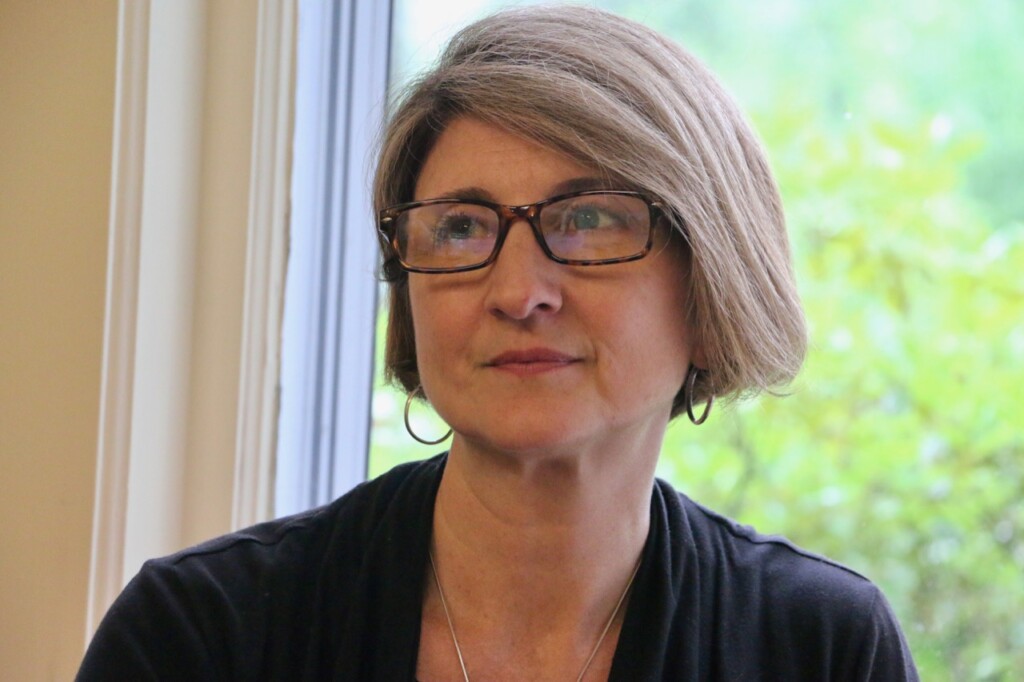
Application Process
To apply, you will need to submit the following documents:
- Complete Online Application
- You may choose to submit either the UVM Post-Bacc Online Application or the Post-BacCAS Application. If you are applying for a Post-Bacc Pre-OT, Pre-PT, or Pre-NP, we recommend choosing the UVM Post-Bacc Online Application.
- Application Fee (see online application)
- Personal Statement
- 2 Letters of Recommendation
- Unofficial Transcripts
Once all your application materials have been received by UVM, our application review committee will review your materials and notify you of our decision of admission. Application and admission decisions are conducted on a bi-weekly basis.
If you are using the Post-BacCAS application, you do NOT need to submit a separate UVM application.
UVM Online Application Checklist
- Online Application – Complete your online application here. You may begin your application at any time, save your progress, and return to it later.
- Personal Statement – Your personal statement is an opportunity for you to describe your reasons for pursuing a career in healthcare.
- Two Letters of Recommendation – As part of the online application, you will be required to identify two professional and/or academic references that should be current within the last two years. Your references should be able to provide an informed opinion regarding your motivation, your intellectual ability, your work ethic, and your personal qualifications. We highly recommend that at least one of your references is academic in nature. Once you’ve submitted your online application, we’ll send a link to your references which will allow them to submit their letters of recommendation directly to our review committee.
- Unofficial Transcripts – you will be required to attach unofficial transcripts of all academic work completed and/or in progress. Be sure your transcripts clearly display your name and the administering institution’s name.
- Application Fee – After completing your online application, a $50 application fee will be required prior to submitting your materials.
If you have questions along the way about our admissions requirements or application process, be sure to reach out to our advising team by emailing Learn@uvm.edu.
International Student Application Deadlines
In order to allow sufficient time to process applications and immigration documents for international applicants, the Post-Bacc Pre-Med Program recommends that applicants submit their application and supporting materials as early as possible. Although deadlines posted by the program may be different, international applicants must submit their documents by the following dates:
Deadline to Submit Complete Application
Fall Term: June 1
Spring Term: October 15
Summer Term: February 15
*Once you have officially accepted the Post-Bacc Pre-Med Program’s offer of admission, the Office of International Education will contact students to request their immigration documents.
Evidence of Financial Support
For purposes of obtaining a visa, the United States Immigration and Naturalization Service requires that all international students submit evidence of independent financial support in the form of a signed statement from a bank or scholarship source.
After you have officially accepted your offer to UVM, the appropriate form and instructions will be sent to you from the Office of International Education.
Please note that all documents showing evidence of financial support should go directly to the Office of International Education.
Documents not issued in English must be accompanied by a notarized English translation.
English Proficiency Examination
The Post-Bacc Pre-Med Program may require international applicants whose native language is not English to submit an English proficiency Exam (TOEFL, IELTS, Duolingo) unless they have completed a degree in the United States.
For further information about the TOEFL or IELTS exams, please see the following websites:
Linkage Agreements
One of the many benefits of attending UVM for your Post-Baccalaureate Pre-Medical education is that you can take advantage of linkage programs when it comes time to apply to medical school, or other health professional school.
As a UVM Post-Baccalaureate Pre-Medical Program student, you are guaranteed an interview with schools on our linkage agreement list, provided you meet the professional school guidelines and meet a minimum GPA requirement in your Post-Baccalaureate Pre-Medical Program.
The UVM Larner College of Medicine Office of Admissions agrees to provide an interview for students who have completed the UVM Post-Baccalaureate Pre-Medical program and seek admission to Larner College of Medicine. To be guaranteed an interview under this agreement, students must have a combined BCMP (biology, chemistry, math, and physics) and GPA of 3.6 or higher in the Post-Bacc program. Students are also required to meet all other criteria for admission.
Additional requirements include:
- Graduation from an accredited baccalaureate degree program or higher at an institution accredited by the National Committee of Regional Accrediting Agencies in the U.S. or Canada
- Cumulative BCPM (biology, chemistry, math, and physics) and GPA of 3.6 or higher in the Post-Bacc Pre-Med program
- The Medical College Admission Test (MCAT) is required of all applicants. For the 2021-2022 application cycle, with matriculation in 2022, we will accept MCATs taken after January 1, 2018. An MCAT score of at least 510 is required for an automatic interview.
- No pending charges or finding of violation of University Policy
- Be a US citizen, permanent resident, refugee, asylee, or have DACA status
The Department of Nursing and the Physical Therapy Program within the CNHS agree to interview students who have completed the UVM Post-Bacc program for admission to the following Doctoral Programs:
- Direct-Entry Doctor of Nursing Practice (DNP)
- Doctor of Physical Therapy Program (DPT)
- Occupational Therapy Doctorate (OTD)
To be interviewed for the any of these programs, students must have a GPA of 3.2 or higher in the Post-Bacc Pre-Med program and meet all other minimum criteria for admission to the CNHS Doctoral Programs, which include:
- Graduated from an accredited baccalaureate degree program or higher
- Completion of the Graduate Record Examination (GRE) – combined score in accordance with CNHS requirements for each program here (GRE waived for those with master’s degree or higher).
Note: The DNP, DPT, and OTD Programs have different application criteria and deadlines. Please check their individual websites for more information.
Master of Physician Assistant Studies Program
The Franklin Pierce University (FPU) College of Health & Natural Sciences agrees to provide an interview for students who have completed UVM’s Post-Bacc Pre-Med program and seek admission to the FPU Master of Physician Assistant Studies (MPAS) Program. To be offered an interview under this agreement, students must:
- Hold a baccalaureate degree at an accredited institution of higher learning.
- Apply to the FPU MPAS Program by the program’s published application deadline and process.
- Have science and cumulative grade point averages of 3.0 or higher, for each.
- Have a favorable letter of recommendation from the University.
- Complete all prerequisite courses and admission requirements per the FPU MPAS website by the time of matriculation. Note: It is understood that some prerequisites may be pending at the time of application.
Note: Students shall apply for admission to the FPU MPAS Program in accordance with the existing rules, policies, and procedures of the program. This linkage agreement does not guarantee admission to the FPU MPAS Program. Admission to FPU MPAS Program is at the sole discretion of FPU.
The UVM Master of Medical Science (MMS) program is a special masters developed by the UVM Larner College of Medicine for pre-health students who have taken the required health professional school pre-requisites and seek to enhance their GPA with a graduate credential. The program is available as an on-campus or online degree.
UVM Post-Bacc Pre-Med students will have a direct entry linkage opportunity to both the on-campus and the online MMS program. Students who achieve a minimum of 3.0 or higher GPA in the Post-Bacc Pre-Med program will receive admission.
*Note: You must notify your Post-Bacc Pre-Med pre-health advisor that you would like to participate in the linkage agreement. You must apply for the OMMS/MMS Program through the UVM Graduate College.
If you are interested in applying to this program contact us at learn@uvm.edu.
For more information on the MMS program visit UVM MMS program.
The University of New England (UNE) College of Osteopathic Medicine agrees to provide an interview for students who have completed the UVM Post-Baccalaureate Pre-Medical program and seek admission to the UNE College of Osteopathic Medicine. To be offered an interview under this agreement, students must meet the following requirements:
- Completed a baccalaureate degree from a U.S. regionally accredited institution
- Successfully completed the following UNE College of Osteopathic Medicine prerequisite coursework with a grade of “B” or better:
- Biology, 8 semester credits with labs
- Inorganic Chemistry, 8 semester credits with labs
- Organic Chemistry, 4 semester credits with lab
- Biochemistry, 3 semester credits
- Physics, 8 semester credits with labs
- English/Humanities, 6 semester credits
- Have science and cumulative grade point averages of 3.2 or higher
- Successfully completed the MCAT with a minimum score of 503, no later than January of the year of anticipated enrollment with official scores received in the University’s Office of Graduate Admissions by March 1, prior to matriculation
- Documented a minimum of 40 hours of direct patient care, experience, exposure, and/or observations at time of application
- Maintain good standing at college prior to enrollment into UNE
- Provide an acceptable criminal background check and meet all program academic and technical standards prior to matriculation into UNE

